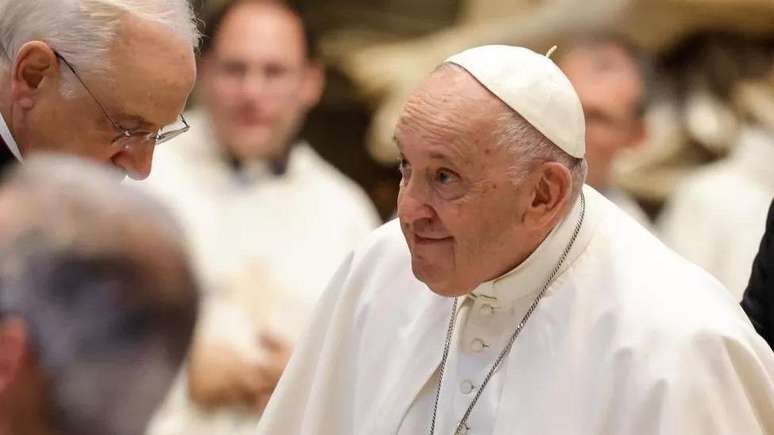According to a Vatican spokesman, the pontiff has a hernia in his abdomen.
Pope Francis underwent abdominal surgery this Wednesday afternoon (7/6) at the Gemelli Polyclinic in Rome. He has to be hospitalized “for several days” to recover from the operation, the Vatican said.
A hernia is “causing recurring, painful and aggravating symptoms”, according to Matteo Bruni, Vatican spokesman,
At 86, the pope is grappling with a series of health problems.
Use a cane or wheelchair due to a knee problem.
The Vatican said the medical team accompanying the pontiff had decided in recent days that surgery was needed.
“In the early afternoon he will undergo a laparotomy of the abdominal wall under general anesthesia”, specified Bruni. “The hospitalization will last several days to allow for the normal postoperative period and full recovery.”
Pope Francis held a regular weekly audience on Wednesday morning and made no mention of the operation.
The day before (6/6), he was in the same hospital in Rome for a scheduled routine exam, months after being admitted for bronchitis.
what is hernia
A hernia occurs when a small section of the digestive organs (such as the intestines) “leaks” through a small hole that opens up in the layers of muscle or other tissue that line and protect that part of the body.
This hole arises due to malformations or weakening of these protective walls of the abdomen.
The organ that has escaped can be strangulated and restricted in the flow of blood to the region.
Generally, hernias usually don’t cause many symptoms in the early stages. If it is not diagnosed and treated, however, the person may experience pain and swelling.
Over time, the problem can progress to more severe pain and difficulty in bowel movements, coughing, lifting, or standing for extended periods.
The hole from which the digestive organ emerges can also increase in size and lead to the unwanted displacement of even more of the structures located in the belly.
According to studies, hernias affect more men and become more common as they age.
The main treatment for the problem is surgery. Most often, the method used is laparoscopy, in which doctors manipulate surgical tools through tiny holes made in the skin.
In some cases it is necessary to perform an open operation, with larger denominations.
In both options, the objective is to put the parts back in their correct position and to plug the holes where the leaks have occurred.
recent problems
In March, Pope Francis spent three days in the hospital to be treated for a lung infection, in the same month he celebrated ten years of pontificate.
Two years ago, in 2021, he spent ten days in hospital after having part of his large intestine (the colon) removed, in an attempt to treat a painful intestinal condition. Recently, he revealed that the annoyance had returned.
Last month the pontiff withdrew from an audience because he had a fever.
Despite health problems, the pope has ruled out the possibility of resigning – like his predecessor, Benedict XVI, who resigned in 2013.
“You don’t run the church with your knees, you run the church with your head,” he told an assistant last year.
The pope is generally considered to be in good health during his decade at the head of the Catholic Church. He continues with a busy schedule and has scheduled visits to Portugal and Mongolia in the second half of this year.
Source: Terra
Ben Stock is a lifestyle journalist and author at Gossipify. He writes about topics such as health, wellness, travel, food and home decor. He provides practical advice and inspiration to improve well-being, keeps readers up to date with latest lifestyle news and trends, known for his engaging writing style, in-depth analysis and unique perspectives.





![It All Begins Here: What’s in store for Thursday 16 October 2025 Episode 1286 [SPOILERS] It All Begins Here: What’s in store for Thursday 16 October 2025 Episode 1286 [SPOILERS]](https://fr.web.img3.acsta.net/img/7d/99/7d99acbb3327f48a72b40f684092775e.jpg)

-qe1jxfyoo3eh.JPG)

